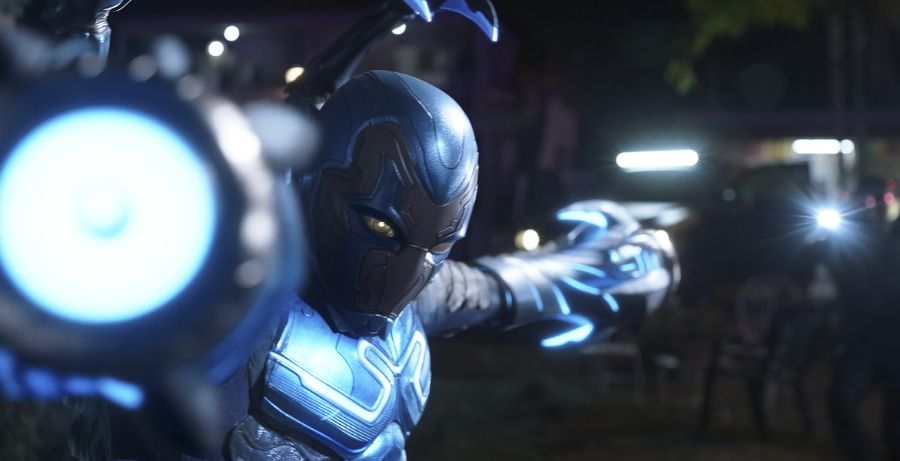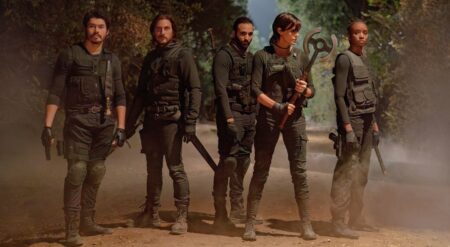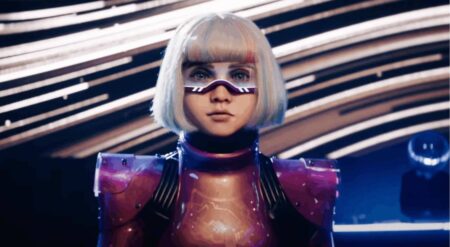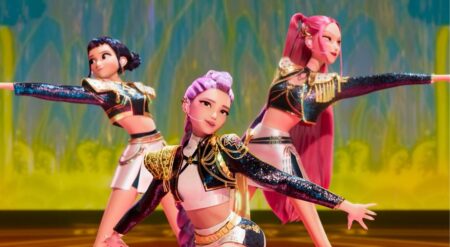Jaime Reyes, as a DC comic-book character, is one of my favorites. Like John Stewart, he isn’t the first to carry his superhero mantle, but he is the one that defined the hero for me. That hero? Blue Beetle. Now, Jaime gets his chance in the live-action spotlight, joining Miles Morales as one of two Latino leads in a film that carries their name. Directed by Ángel Manuel Soto and written by Gareth Dunnet-Alcocer, Blue Beetle stands apart from other films in the superhero genre by embracing family at its core by letting them in on the secret. And that helps propel the film’s story thanks to an electric cast that makes up Jaime’s family.
In the film, which takes creative license with Jaime’s origin story, Xolo Maridueña stars as the titular Blue Beetle, Jaime Reyes, a recent college grad who returns to his hometown, Palmera City with big dreams. Only, when he gets home, he realizes that his dreams of law school and leaving the Palmera Keys aren’t in the cards when he has to forgo the future he imagined to help his parents keep their house. As he searches to find his purpose in the world, fate intervenes when Jaime unexpectedly finds himself in possession of an ancient relic of alien biotechnology after a failed “interview” with Kord Industries. The biotech known as the Scarab sends Jaime’s life into chaos after he becomes its symbiotic host and gains an incredible suit of armor with extraordinary and unpredictable powers, changing at a moment’s notice to fit his needs in battle.
The central conflict of Blue Beetle is essentially capitalism. As Jaime unwittingly becomes the host of Kord tech, Kord Industries chases him down to gain access to the Scarab and its advancements for weapons of war. On top of that, the company has been pushing out families from Palmera City’s outskirts, taking their homes and destroying communities to make large condos in their place. While there are moments discussing the gentrification that’s pushing the Reyes’ out of their home, the film takes the time to show the issue at hand instead of telling the viewer everything. We are shown the ways that Kord, and specifically its head Victoria Kord (Susan Sarandon) are harming those around her for power, with Jaime and his family at the center of it all as their victim and as the only force to stop the company.
As a whole, Blue Beetle is very different from the character in the comics and Young Justice. Jaime Reyes has been shifted from a teen from El Paso, thrust into power by the Scarab with his friend at his side, to being a twenty-something in a fictional city. While some didn’t see this as a large change to Jaime’s character, it really was. El Paso, Texas, as a border town is often depicted as a city in turmoil. What Jaime did in the comics and Young Justice was showcase El Paso as a vibrant city of family and joy that showcased a border town in a story about a hero and not some large narco plot.
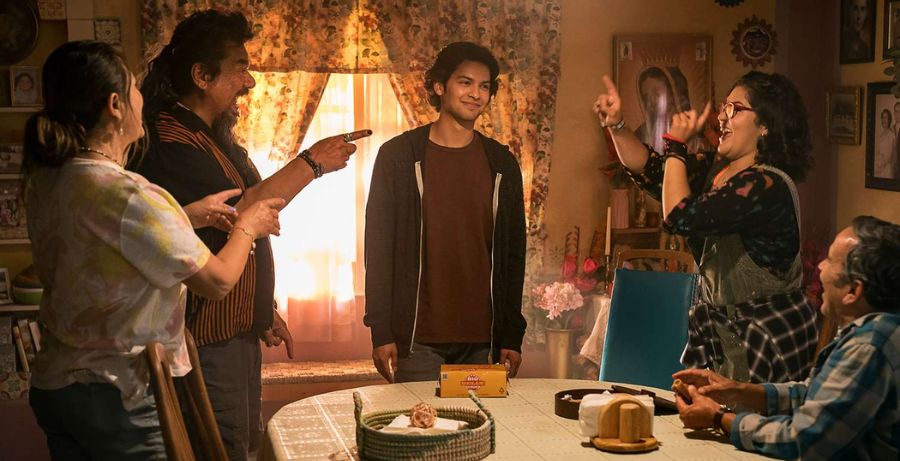
When El Paso was removed, there was a fear that his Mexican identity would also be stripped away in favor of a more palatable pan-Latin identity. I was worried that a hero that meant so much to the communities in my state had been turned into something he isn’t in a time when border issues are at a height and violence against migrants from the public and the government are on the rise. A kid from El Paso being a hero means a whole lot. Thankfully, a kid from Palmera City does too.
While El Paso isn’t the epicenter of this narrative, it does show in small moments, in shirts on the back of a seat, a street name, like small pieces of Texas saying hello to the Tejanos in the audience. That said, this film is unapologetically Mexican-American, which could easily be expected with the casting of George Lopez as Uncle Rudy. But the moments of Latinidad aren’t beating the audience over the head as if checking boxes. Instead, they’re honest portrayals of family life in a Mexican family. It’s a family that picks on you, it’s a picture of the Lady of Guadalupe on the wall, “La Chona” playing when that uncle makes his appearance in the film. It’s in Cypress Hill playing during a climactic fight scene. Hell, it’s in the red and yellow piece of tech that gets the nickname “El Chapulín” based on the other iconic insect-inspired suit for El Chapulín Colorado.
But most importantly, Ángel Manuel Soto and Gareth Dunnet-Alcocer have written a script that puts Mexican resiliency, no, Latino resiliency, at the core of the story. In a pivotal moment of the film, Jaime is told by his Nana (Adriana Barraza) that he can cry later because right now he has a job to do. Get it done and cry later is a testament to the legacy of resiliency our communities carry. We are our own heroes, and through strife and struggle we have to put our tears to the side and feel them deeply when the time comes, but only when the job is finished.
Read Our Interview With Director Ángel Manuel Soto here.
That specific element of resiliency is often chided in articles about burnout written by people who aren’t from brown or Black communities. But it’s how we survive and, ultimately, how we are able to get to a point where we thrive. It is important to showcase that element of life in a positive light, and in a way that celebrates feeling grief and sadness when the moment is right instead of pushing it away. And it makes Jaime stronger.
Like in Across the Spider-Verse, one of the main themes in Blue Beetle is that a hero doesn’t need to be alone. The Reyes family is important to the story and the cast behind them helps make the narrative moments in the film that happen between them feel honest. Whether it’s Damián Alcázar as Jaime’s father Alberto, Elpidia Carrillo as his mom Rocio, or Belissa Escobedo, George Lopez, and Adriana Barraza as Milagro, Rudy, and Nana, respectively, every interaction between the characters and Jaime feels lived in. While star Xolo Maridueña holds your focus as an awkward and charismatic Jaime, his family helps create a dynamic world to live in and one to fight for.
Maridueña has chemistry with every single character in the film. There is a charm to his uncertainty that radiates through every scene, whether it’s in-person or through voice work with Becky G, who voices Khaji-Da , the Scarab. Additionally, while his crush on Jenny Kord (Bruna Marquezine) isn’t perfectly paced with the rest of the film, his chemistry with Marquenzine is undeniable. Maridueña is a leading man, and whether it’s as Jaime or another character, his future in action looks bright. His ability to play off of anyone he’s put next to ensures that he’ll manage to hold your attention and build the story larger. Like other actors who have defined their superheroic characters, Maridueña is Jaime.

Additionally, on the action and adventure front, Blue Beetle excels. The practical suit build shines brightest among the effects work on the film. By casting an actor known for martial arts in Cobra Kai, it’s no surprise that Maridueña is fantastic in this action-forward role. Additionally, he’s able to capture the emotional range that the story calls for, especially the silence of just trying to survive and the rage of fighting for people who are important to you. And that acting is met with some of the better uses of CGI in a big-budget superhero film that we’ve gotten in quite some time.
All of that said, Blue Beetle isn’t perfect. While it presents a strong connection for Latino fans with a resonance that enhances the emotional elements of the story, the film’s pacing is often uneven with comedy, primarily from Lopez, not allowing moments of emotional weight to execute the full somber note that it intends. While the film uses a particular brand of Latino humor well, one that is reminiscent of what Lopez does on his current family sitcom, other moments feel like too much is thrown in. Sure, we all have that uncle, but when emotional choices are meant to build into a personal growth crescendo, having Rudy burst in undercuts that.
There are moments in the film that feel like a superhero film from the 2000s in a great way. There is more heart and care put into the connections between characters, but then there are moments that represent that era of the hero canon in a negative way, primarily in weak third-act villain turns and too much verbal exposition with mustache-twirling plans. While the former is charming, the latter can deflate certain moments of intensity. One of those pieces is a forced romance that makes Jaime make dumb decisions in the face of danger in the name of heroism. Sure, the film boldly throws out some superhero tropes, but at other times it embraces them, like ending it all with a kiss.
Still, Blue Beetle is a film that earns a resounding grito. As a story, it knows who Jaime is and leans into the character beyond his suit and powers — even if they’re some of the best moments in superhero action this year. While some characters have just become a mantle you can change from one person to the next, Jaime Reyes is Blue Beetle. He’s resilient, he’s charming, and by the end of the film, he’s a warrior. Here’s to hoping that James Gunn and Peter Safran embrace Blue Beetle in their new DC universe.
Blue Beetle is in theaters nationwide August 18, 2023.
Blue Beetle Director Ángel Manuel Soto talks Latino Resiliency
Kate Sánchez, Co-founder and EIC of But Why Tho?, spoke with Director Ángel Manuel Soto ahead of the highlight anticipated release of Blue Beetle which will see DC’s first live-action Latino superhero hit the big screen. You can find Kate’s review of the film at https://butwhytho.net/.
Blue Beetle
-
Rating - 7/107/10
TL;DR
Blue Beetle is a film that earns a resounding grito. As a story, it knows who Jaime is and leans into the character beyond his suit and powers… While some characters have just become a mantle you can change from one person to the next, Jaime Reyes is Blue Beetle. He’s resilient, he’s charming, and by the end of the film, he’s a warrior.

